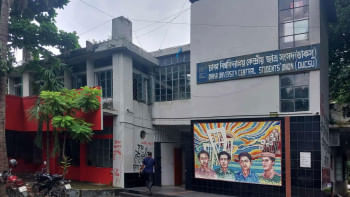The hidden costs of free trade deals
There is an old joke: a man arrives at a seedy motel and is offered two options. The economy room costs $10, while the premium room is $12.
"What is the difference?" he asks.
"The $12 room comes with a free TV," replies the receptionist with a smile.
The humour lies in the contradiction. The TV is "free" but costs more. As Bangladesh prepares free trade agreements (FTAs) with as many as two dozen countries, the joke is a timely reminder: in global commerce, there is no such thing as a free deal. The large print giveth, while the small print taketh away, as the saying goes.
FTAs are not inherently problematic. In fact, they can be useful instruments. But like the motel's "free" TV, the hidden details often decide whether the bargain is truly beneficial.
As Bangladesh graduates from the least developed country (LDC) club, it will lose preferential access to key markets. FTAs, therefore, will be essential to maintain exports without prohibitive tariffs.
Well-negotiated agreements can protect competitiveness. However, poorly constructed ones can exact a heavy price. Negotiation is an art that requires expertise, foresight and above all, experience. Developed countries such as the US, UK and Japan already possess these qualities. For Bangladesh, this remains largely uncharted territory.
FTAs are lengthy and complex. Beyond goods, tariffs and dispute settlement, they may demand inclusion of services, investment, intellectual property, digital trade, government procurement and more. Hidden within dense legal text may be clauses that seem harmless but carry far-reaching consequences.
One concern is intellectual property. Bangladesh has limited experience with patents, as its LDC status exempts it from implementing them.
The Bangladesh Patent Act 2023 carefully balances protection of domestic industries with encouragement of innovation, while complying with the WTO's TRIPS framework.
But FTAs often go further, embedding "TRIPS-plus" provisions that extend patent life and ease approval of new patents. These stipulations can drive up the cost of essential medicines.
For example, Osimertinib Mesylate, used for non-small cell lung cancer, sells for about $600 per tablet under patent protection. A generic version manufactured locally by Eskayef costs less than $4. If Bangladesh is forced to adopt stronger patent rules through FTAs, access to affordable generics could be severely curtailed.
Agriculture presents another risk. Developed nations often subsidise their farmers, allowing them to export at below real market costs. The US and EU, for example, heavily support their agricultural sectors.
If Bangladeshi farmers are made to compete against such subsidised imports without protective measures, many could face ruin.
There is also the question of revenue and policy autonomy. FTAs usually reduce or remove tariffs, which for developing countries can mean a significant loss of government income. More troubling still is the erosion of policy flexibility. Once treaty obligations are signed, governments lose room to shape their own economic strategies.
FTAs are not inherently harmful. They can be necessary tools for global trade integration. But the devil is in the detail. Without rigorous negotiation and technical expertise, Bangladesh risks outcomes that outweigh the benefits.
For a country graduating from LDC status, an FTA can be a rose with thorns -- attractive but risky. At worst, it could become a stranglehold on national policy.
The challenge is not whether to sign FTAs, but how to negotiate them wisely, ensuring that the pursuit of market access does not compromise national interest.
The writer is the CEO of Renata PLC.

 For all latest news, follow The Daily Star's Google News channel.
For all latest news, follow The Daily Star's Google News channel. 



Comments